


























Dear Editor,
Six minutes of passing period time? Its definitely not enough for the students to be able to enter their classes on time or for teachers to be able to recuperate after each class period.
In our large school, many students have a class period on side of the campus near the 700 building, while having their next class in the 1500 building. The distance between both of those buildings barely gives us enough time to get to class.
Reverting to the previous 8-minute passing time would give students more time to get to their classes and even lessen tardiness throughout the school.
KIONI CLARKE, 12
Dear Editor,
We need more spirit weeks throughout the year. We have one for HOCO and the week before midterms, but that’s pretty much it. I remember my freshman year we had one the week of Halloween, but we haven’t done one since.
I think we should have multiple spirit weeks throughout the year, and not just in the first semester, we should also have some in the second semester too. We should have them for HOCO, Halloween, Christmas, right before the week of midterms, one before spring break and one at the end of the year.
This school needs more spirit weeks. Something that students can be excited for each year and something incoming freshman can look forward to.
MADELYN SONNE, 12
Dear Editor,
There is an issue I have with prejudiced ideals against LGBTQIA+ students. While this issue is probably not as visible as it was in October 2023, it still exists.
Peers sometimes use the word ‘’gay’’ as a mocking or degrading insult. Transgender students who do not pass (being perceived as the gender someone identifies as, rather than their sex assigned at birth) run the risk of being bullied and becoming depressed as a result.
We should work together as a society and as a community and as a school to decrease ignorance and increase acceptance. For example, students facing consequences for prejudiced bullying should not only be given just a detention, but rather be educated on why the bullying was wrong and have open discussions with queer classmates.
VINH NGUYEN, 12
Dear Editor,
Saying “school feels like jail” isn’t anything new, but this new year has given that statement more truth. The metal detectors and the phone ban this year have annoyed many people.
For me, I’m not completely opposed to new
Dear Editor,
policies. I still find them annoying, but I can understand how they came to be.
I just think that as more policies and regulations are added, it sucks more joy out of school. It makes school, which can already feel tedious at times, feel more restricted.
AMAYA EDWARDS, 12
I have never been one to choose political sides for simple reasons. I usually choose facts and will do so when I get old enough to vote. However, I observed a recent trend in media and schoolmates where people want someone to be elected because of something that has no relation to the policies they want to put in place or their political views. What I mean by this, for example, is our presidential candidates; where people choose Harris because of her being a woman of color and people choosing Trump because they hate Harris’s laugh and that he is funnier to them.
To be honest, I do not see why that should influence an opinion at all. What does an outward appearance or personality have to do with how they will run our country?
Dear Editor,
Dear Editor,
This may be some type of a cliché, but I know what it’s like to be dress coded for wearing the same thing as another girl. Dress code has always gotten on young girls’ nerves mainly because it stopped them from showing insane amounts of skin and cleavage.
But for me, I just struggled to wear an acceptable pair of shorts. I was too tall, and my arms were too long. I believe that a dress code should accommodate our bodies. I won’t play the “teach the boys card” because that’s not my problem.
My statement is to make it clear how
Dear Editor,
Another thing I observed is people do not realize that the president can only do so much without Senate. If you want things to be set in motion, you also need to vote for other government members senators. Personally, I don’t think many people in our generation realize this isn’t a joke, it’s our country’s future.
KALLI WHEELER, 11
different we all are, and that dress code should be changed and molded to the different body types. This can also include going after “curvier” girls.
If I, an athlete with thick thighs, a small, and average chest, were to wear some sort of crop top that is cut low and super tight leggings, I would be more likely to attract attention, right?
What I see a lot is flat girls getting off the hook; while if you have more, you get in trouble more. You wanna enforce rules? Make them make sense.
SYDNIE DUHANEY, 10
Doctors are here to help their patients, but one thing I do not understand is when they are irritable towards patients. They have expressed fretfulness towards me, as well as other patients from what I have observed. People sit in pediatric offices for about an hour just to be rushed out of the office.
At my doctor’s office I was communicating a genuine issue with the nurse, and she kept trying to tell my mom and I things that we have been over many times like if I get enough sleep, water and food.
I was telling the nurse that I am very on top of my schedule, especially with things that can affect my physical health. She kept asking the same questions in different ways. It’s like she wasn’t getting the answers she wanted and that she wanted to be done with me instead of taking the time to help. After I answered each question about three times and tests unrelated to what I was trying to express, I finally was able to get the help I needed. I don’t feel that people should work in careers they are not passionate about nor content with.
RHIANNON MARKAJ, 12
Send Us a Letter
Have something to say about the school? Have something to say about a local, national or global issue? Have something to say about this issue of the Eagle Eye?
We want to hear your opinions. Email submission to: MSDEagleEyeNews@gmail.com Submissions must be between 100-200 words
My main problem with this school is the phone pouches we are required to put our devices in. Students should be encouraged to pay attention in the class by the enthusiasm of their teachers.
There have been several instances where having my phone in a pouch has hindered my ability to do work or send important messages to people outside the classroom, like my parents.
If kids are addicted to phones, taking them away will only make them want it more. Students will never learn the lesson that using your phones in class will hurt your performance and grades if the schools make us put them away in the first place. In a place where learning lessons are most important, it is ironic they keep us from learning this lesson.
CONNOR MACKENZIE,
10
Dear Editor,
Our school desperately needs more lunch tables because the current situation is far from ideal. Many students are forced to sit on benches or even the floors in hallways during their lunch period. This creates an unhygienic and uncomfortable environment.
All tables from inside the cafeteria to outside in the courtyard are filled to the maximum capacity. By having enough tables, we can ensure that all students have a proper place to sit and eat.
If the school adds additional lunch tables, students will be provided with a cleaner and more orderly atmosphere. This will help make lunchtime a more enjoyable experience for everyone.
OLIVIA PADOWITZ,
10
Dear Editor
Why does Douglas not have a Driver’s Ed program? There are schools that offer it. Why doesn’t this one?
Help students learn how to drive. There are students whose parents don’t have time to teach them or don’t have the means to hire someone else to teach them.
Driver’s Ed would help so many students at this school. How come economics is now a required class, but another thing that would prepare us for the “real world” isn’t even an option? We deserve to learn how to drive at the place that is supposed to teach us.
LONDON ABDALA-RIVERA, 11
JROTC MEMORIAL. The Junior Reserve Officers’ Training Corps commemorated the lives lost on Sept. 11, 2001 on Wednesday, Sept. 11.
JROTC students took turns throughout the day standing beside a memorial recreation of the twin towers in the courtyard. National Honor Society Presidents Lindsay Rogalla and Kody Brereton spoke on the morning announcements, and seniors Alanis DeSouza, Ellie Pulsifer and Brooklyn Bhim sang the National Anthem.
MULTICULTURAL TRYOUTS.
The Marjory Stoneman Douglas High School Spanish Club hosted the Multicultural show tryouts on Tuesday, Sept. 3, Monday, Sept. 9 and Thursday, Sept. 12. The Spanish Club will host their annual show Friday, Dec. 6 during both first and second periods and as well as an evening showing in the auditorium.
NATIONAL MERIT
SEMIFINALISTS. MSD had six semifinalists for the annual National Merit Scholarship this year,
announced on Wednesday, Sept. 11: seniors Analyse Armstrong, Melissa Azzarito, Ella Maurice, Elle Makena Naqvi, Sean Nixon and Aidan Tau. Semifinalists qualified based on their PSAT scores from October 2023.
HOMECOMING FOOTBALL
GAME. MSD varsity football team lost to the Boyd H. Anderson Cobras 7-41 in the Homecoming game on Friday, Sept. 20.
VOLLEYBALL SENIOR NIGHT.
MSD’s women’s volleyball team held Senior Night on Monday, Sept. 30 in a game against Flanagan High School, winning 3-0. The team celebrated the 11 seniors on the team: right side Gracy Fraysure, middle Lindsay Rogalla, setter Elle Makena Naqvi, libero Sophia Maresca, libero Camilla Marrero, middle Aviyah Henderson, outside Addison Walker, libero Victoria Llavaneras, setter Lily Ledbetter and team managers Samantha Orr and Rya Shahbazi.
DISCIPLINE ASSEMBLY. MSD held

GET YOUR HEAD IN THE GAME. Reviewing her schedule, junior Emma Schwartz checks Focus on a school computer. Focus is a new, one-stop student information system designed to replace previous programs, such as Pinnacle and Virtual Counselor. “It’s a major shift from something that we have had for a long time and knew well,” Schwartz said.
PHOTO BY Grace Brill
Broward County Public Schools implements new student information system
irst, check Pinnacle for grades. Next, Virtual Counselor for graduation requirements. Then, Parent Link for bus information. A $1.5 million a year investment later and none of these platforms are needed. The Focus Student Information System, introduced by Broward County Public Schools in the 2024-2025 school year, serves to simplify student record management by eliminating the need for multiple platforms.
Having signed a 15-year contract, the district
discipline assemblies every period on Thursday, Aug. 22 and Friday, Aug. 23 for all students. Administration reviewed proper conduct, including dress code and fights, with all students. In this assembly, they announced a new “wireless devices” policy.
IMPACT TESTING. MSD athletes interested in participating in MSD sports had to take the impact test Monday, Sept. 30 in room 211. Students had to take the concussion test for athletic clearance to be eligible to tryout for any sport.
HURRICANE HELENE. Broward County Public Schools canceled school on Thursday, Aug. 26 due to Hurricane Helene, a massive storm that made landfall as a category 4 storm near Tallahassee, Florida. School operations resumed as normal the next day, Friday, Aug. 27.
PRACTICE SAT. MSD held a PSAT on a school day for freshmen, sophomores and select juniors on Thursday, Oct. 17, which was
implemented Focus to consolidate attendance, grades, scheduling, report cards, transportation and communication into one platform, providing a centralized hub for parents and students to access essential information. Focus also allows families to view grades, track graduation requirements and monitor attendance.
The district announced the new decision in the spring of 2024. Teachers and other faculty members from Marjory Stoneman Douglas High School had to attend a district-created training in person before school started, where they learned to navigate Focus. The district also offered seminars to the parents of Broward students, which showed them how to navigate Parent University, a branch of Focus.
Staff at MSD have been adjusting to the new system with mixed reactions from teachers. Media Specialist Diana Haneski remains optimistic about Focus’ benefits, despite the challenges that accompany learning the new system.
“Right now, it’s like anything when you’re learning something brand new,” Haneski said. “There’s a learning curve, so it’s not as easy as something you’ve used for years, but I’m optimistic that it’s going to be good.”
Some MSD students find Focus convenient, as last year, they had to use multiple platforms such as Pinnacle and Virtual Counselor to locate student information. Still, the system is unfamiliar and going to take some getting used to.
“Although Focus is easier to navigate through for my grades for school, I’m still not a big fan
rescheduled from Oct. 9 as a result of Hurricane Milton. Juniors who wanted to take the test to potentially qualify for a National Merit Scholarship had to pay $12 on the e-store prior to registering.
HURRICANE MILTON. Due to Hurricane Milton, BCPS canceled school on Wednesday, Oct. 9 and Thursday, Oct. 10. Milton, a historically fast-developing and strong storm, made landfall on Florida’s West Coast in Siesta Key, Florida as a category 3. School operations resumed as normal on Friday, Oct. 11.
JERSEY DAY. In honor of Hispanic Heritage Month, Mujeres Unidas, Spanish Club and Latinos in Action held a spirit day on Tuesday, Oct. 15. Students were invited to wear their country’s jerseys to represent their heritage on the last day of Hispanic Heritage Month.
REPORTING BY Carolina Ochoa and Brynn Schwartz
of it because I got used to what I have been using for years with Pinnacle, and I don’t want to change it,” senior Michael Cacace said.
While the system offers many benefits, the real challenge lies in how teachers and students approach it, especially for those less familiar with technology.
“I think it’s a mindset issue,” Haneski said. “It doesn’t matter if you’re young or old; it’s about having a growth mindset when learning something new. Many teachers are helping each other, which is wonderful to see.”
Haneski, who was involved in the initial district training for Focus alongside Testing Coordinator Matt Winans and Assistant Principal Anna Koltanova, acknowledged the difficulties of adapting to a new system, particularly over the summer break.
“We had district training in person during the spring, which wasn’t ideal timing because we were leading and learning, then off for the summer, and then back for pre-planning,” Haneski said. “But the support from the team has been great.”
All teachers were required to complete a course on the system before the start of the school year, ensuring that they were prepared to navigate the new platform and assist students.
While the full impact of Focus remains to be seen, MSD students and staff continue to adjust to the new system. With continued support from district and school resources, Focus is set to be a tool for grading and organization in BCPS for years to come.
STORY BY Landon Levine
MSD’s school board orders to demolish the 1200 building over the summer
Following the completion of all trials surrounding the 2018 shooting at Marjory Stoneman Douglas High School, the 1200 building was torn down. The building demolition began on June 14 and was completed in early July; in its place, a legacy field will be created.
The building was the site of the Feb. 14, 2018 school shooting, which killed 14 students and three staff members.
The decision to demolish the building was made in 2018 by School Board of Broward County, but the demolition could not be carried out until the completion of two criminal trials. The building was used as evidence in both trials and was preserved for the juries to view.
Once both trials concluded, the building was given back to the school board, at which point the district hired a contractor to demolish it.
In preparation for the demolition, cleaning crews went through the building and disposed of textbooks, laptops, desks, balloons, flowers and any other objects left in the classrooms. The contractor used an excavator to take apart the building in sections, starting with the top floor. The process was mechanical and not explosive so it had to be done slowly and in parts.
During demolition, tents were set up on the side of the senior lot for the families of the victims and MSD faculty to observe the event. After the building was dismantled, the remaining debris was removed from the site for disposal.
“I think it was very troubling for people to
have to continually drive past that building,” Principal Michelle Kefford said. “That’s what has been communicated to me by so many people who actually avoided that area when possible, so they didn’t have to see it. I know some of our staff members wouldn’t park near that area, and so not having that constant reminder of that horrible day is beneficial to everyone.”
The building’s footprint will be turned into a multipurpose turf field named Legacy Field, which the Eagle Regiment, JROTC and other student groups will be able to use to practice.
The Legacy Field was proposed by MSD’s Faculty Council, which meets regularly with administration to address issues affecting faculty and staff. The entire faculty was surveyed for input on plans for the space.
Students were surveyed last year to gather their opinions. The majority of students favored more parking in the senior lot or a usable outdoor space. Family members of the victims also provided input on plans for the space.
The results of the survey in conjunction with the Faculty Council proposal were presented to Superintendent Dr. Howard Hepburn, who ultimately made the decision to move forward with the Legacy Field proposal.
It is still unknown when the Legacy Field will be ready for student use. The area is currently an open sod field, and there is no available timeline for completion of the project.
STORY BY Rio Rice
School Board of Broward County passes new policy restricting phone use during school hours
The School Board of Broward County passed a new cell phone policy in July, affecting all students in grades 6-12. The new policy prohibits students from using their cell phones from the first bell to the last bell of the day, including lunch, passing periods and study halls. Earbuds and headphones are also forbidden during school hours.
All students are required to turn their phones off or keep them on airplane mode throughout the day. Airplane mode blocks any incoming notifications and prevents access to most apps, even when cellular data is turned on.
The ban, while supported by the school board, raised safety concerns from some parents of students. If an emergency happens at school, some students and parents believe that they may not be able to contact their parents. However, at MSD, teachers that collect phones from students are encouraged to keep them in their designated safe zone in case an emergency does arise.
While the school district controls phone use policy, teachers also have jurisdiction. Some teachers may require their students to put their phones in cell phone pockets, thus stopping them from accessing their phones. Others may allow their students to keep their phones with them
in their bags. Teachers can also allow the use of phones in class for educational purposes or free time. This is the result of Florida’s House Bill 379’s measures, passed in 2023, which restricts the use of cell phones and designates a place for them during instructional time.
“I think it’s really nice because people are having more conversations and getting to know each other better,” Advanced Placement Literature teacher Andrea Kowalski-Rospierski said. “I am also getting to know students better.”
The new cell phone policy is currently facing disapproval from many MSD students.
“Banning phones altogether, including during lunch and class changes, just doesn’t benefit us the way they thought it would,” sophomore Lucy Woo said. “I don’t like that it exists and that they have the authority to theoretically take my phone during my free time.”
Despite the new rule, some MSD students continue to use their phones during class, free periods and lunch.
“I think students need to use [cell phones] to complete homework and also to study during lunch,” junior Samera Kathuria said. “Students only have so much time after school with
CRASHING DOWN. Excavators progressively demolish the 1200 building on June 18. The equipment used to slowly remove the building was selected to minimize the environmental impact of the demolition.
TEARING IT APART. A large excavator begins to demolish the 1200 building at Marjory Stoneman Douglas High School on June 14. The demolition came six years after the deadly shooting that killed 14 students and 3 staff members. “We have been waiting a long time for that building to be demolished,” MSD Principal Michelle Kefford said. “I was working every day, so I got to see the progress firsthand. It’s now completely gone.”



extracurriculars to study, so having this added time at lunch is really helpful.”
By implementing the new law, the School Board of Broward County and school staff hope to refocus the attention of students toward school and improve grades. Despite objections from students and parents, the phone ban will continue throughout the school year, and it is unlikely that the policy will be removed or changed.
STORY BY Ahana Tippanagoudar
NO-PHONE ZONE. At the start of her teaching academy class, junior
prohibiting the use of electronic devices from the time school starts to the time it ends, including during lunch.
don’t feel any negative way towards putting my phone away every day,”
“Sometimes I enjoy getting some down time away from my phone.”







MSD implements metal detectors in accordance with new BCPS policy
Broward County Public Schools installed metal detectors in its high schools at the start of the 2024-2025 school year. These metal detectors have been present at every entry point of all 32 BCPS high schools, including Marjory Stoneman Douglas High School.
The summer prior to this school year, BCPS posted an announcement on their website, which provided information about how the metal detectors would be instituted.
The policy was designed to ensure safety in schools by detecting and preventing weapons and other harmful objects from entering school campuses. The metal detectors are in place to provide tighter security and address safety concerns.
Metal detectors were first tested at Flanagan High School and J.P. Taravella High School during their 2024 summer school session. The initial test was done so that BCPS could fix any problems with the system and address efficiency issues in time for the 2024-2025 academic year.
At MSD, metal detectors are located at the senior lot, bus loop and front gate entrances, and students must pass through them to enter the school.
In addition to students, all visitors are subject to screening in the front office before they can
enter campus. However, this excludes security personnel and other staff members.
“We do not have to go through the metal detectors,” AP Psychology teacher Ronit Reoven said. “They don’t have us, the staff and faculty, go through it. We park, and we walk through the building that we’re heading to, nothing holding us back.”
Many administrators and security personnel had to be trained over the summer
detecting process was off to a rocky start. Students had to wait in long lines at all of MSD’s entry points. Many were up to 40 minutes late to their first period class, leaving insufficient time for instruction.
“After the first day, we didn’t really change anything, just what students took out of their bags,” Anderson said. “Security was in charge of directing students through the machines, while administrators assisted when needed.”
“We do not have to go through the metal detectors. They don’t have us, the staff and faculty, go through it. We park and we walk through the building that we’re heading to, nothing holding us back.”
Ronit Reoven AP Psychology teacher
in preparation for the implementation of metal detectors.
This way, mornings could run smoothly, without any issues.
Personnel were trained to use the metal detecting wands, and learned how to restart the detectors and perform basic maintenance.
“We had to take a couple classes [about the metal detectors] over the summer, and then we had a test run at the school, with the real thing,” security guard Rashaan Anderson said.
On the first day of school, the metal

I don’t like that the security guards have to go through my bag when the metal detector gets set off. It feels like an invasion of privacy.”
This led to a tweak in the entry process. Staff advised students to keep binders in bags, unless there were multiple.
They also instructed students to take out water bottles, laptops and tablets and to walk through the detectors with their backpacks on their stomach.
The metal detectors themselves had adjustments made. Their sensitivity was lowered, making it so that smaller items did not set the metal detectors off. After this, the lines were visibly shorter, with faster access to campus.
MSD students differ in their opinions of the metal detectors; some are in favor of them, while others find them to be a troublesome process in the morning.
“I think the metal detectors are ridiculous,” junior Laina Armbrister said. “I’ve been stopped every day for setting it off, and I don’t know why. The lines get really long and can make you late to class which is annoying.”
Other students believe the metal detectors are successful in keeping schools safer.
“I think the metal detectors have helped in general,” senior Vincent Ciullo said. “Even though they have caused some delays getting into school, the metal detectors provide an extra sense of security for me. I believe the school is safer than ever now because of the metal detectors, as they provide a way to discover a threat before it becomes a bigger problem.”
Students have found ways to tolerate the process and make it easier for themselves.
“One way I made the process of going through the detectors easier is to take out whatever metal objects I may have in my bag, like keys or an umbrella, before I even leave my house, just so I can have them in my hand while I’m walking through,” Ciullo said.
Overall, the metal detectors serve as a way to prevent any harmful objects from entering campus, protecting students and staff. They are here to stay and provide stronger security for high schools across Broward County.
STORY BY Chelsea Townsend

The metal detectors are basically an extra safety precaution for our school. I don’t think they’re that timeconsuming to go through and in the end it will be beneficial to have them on campus.”
Vincent Ciullo, 12 Laina Armbrister, 11
As students begin to settle into the classroom after the call of the final bell, the teacher begins her lesson. Within moments, the sound of heavy footsteps can be heard from outside. The whole room begins to shake. The students look up to the ceiling as pounding and drilling echo from above, drowning out the voice of the teacher. She sighs, waiting for them to finish before continuing her lesson. The construction workers are repairing the roof.
Construction efforts beginning at the end of last school year have brought major changes to Marjory Stoneman Douglas High School’s campus. This included the demolition of the 1200 building, and it currently involves renovation of a number of buildings on campus.
Beginning at the end of last school year in April, major repair efforts have consumed almost every building on campus. The overall project called for new air handlers for the HVAC system–the heating, ventilation, and air conditioning system. Each building has its own system, so each needs to be installed separately.
The project also required the placement of new roofs on all buildings, except for the 400, 700 and 900 buildings, and the implementation of a new fire alarm system that will fully replace the current system.
The renovations are part of Broward County Public School’s SMART bond program, an $800 million capital improvement program approved by taxpayers to repair school facilities, and provide schools with technology, athletic equipment and musical instruments.
This district-wide program, which was first implemented in 2014, has undergone multiple state investigations due to its alleged mismanagement. What was initially supposed to take five years to complete is now in year 10 and is $525 million over budget.
MSD construction plans took several months
and received approval to begin at the end of last year. The construction is expected to be completed at the end of summer 2025.
In the summer of 2023, the 100, 400, and 900 buildings received new air handlers. The 200 building air handler installation was completed during this past summer, and at the start of this school year, construction began on the 600 building.
The three teachers in the upstairs 600 building were temporarily relocated to empty classrooms in the 900 building. They have since returned to their rooms, and now 300 building teachers have relocated.
Originally moved from downstairs in the 800 building to upstairs in the 900 building, band students had to bring all their instruments and equipment up the stairs and practice in a room that is much smaller than the band room.
“The construction around campus has really limited the availability of space across the whole campus,” junior Alyssa Rapps said. “Not only can we not use the band room for rehearsal space, but we can’t use the auditorium either. This really becomes a problem when there’s bad weather, and we just have nowhere that is big enough for all of us.”
The construction affected band practice
“
I wish they wouldn’t do [the construction] during school. It’s really distracting, especially when we’re trying to learn.
Tam-an Nguyen, 12
The auditorium and the band hallway were unusable for the first two months of school due to construction projects related to the HVAC system, roof and a band room redesign.
“Well it’s not unusual for us, for drama to rehearse in our room prior to our shows,” theater teacher Melody Herzfeld said. “What we usually do is we rehearse for months in our classroom, in 710, and we really don’t go into the theater for setup and construction work until two to three weeks before each show. But what it has affected is all of the learning opportunities for new tech students so they can understand how to handle lighting and sound and specific things about the auditorium that are the basis of technical theater so that we can support all of the other groups that do go in there.”
during the summer as well. Because trucks were coming and going from the senior lot, students had to wait until the demolition of the 1200 building was fully completed to begin summer band camp.
Later in this year, construction will start on the 500 building, which will require those to relocate their classrooms. New portables have been installed by the district to house these classes when this phase of construction begins.
Work on the roof and alarm system takes place during the school day and over the weekends. During instructional time, the noise can be distracting for students and teachers. Sounds of the workers hauling and replacing the roof can be heard throughout the day.
“I wish they wouldn’t do [the construction]

during school,” senior Tam-an Nguyen said. “It’s really distracting, especially when we’re trying to learn.”
The construction also has interfered with the functioning of clubs on campus, over this summer and after school. For instance, Marjory’s Garden Club, a student-run club that works on maintaining and expanding the on-campus garden, was unable to work all summer due to construction crews coming and going from the bus loop lot. This put a major dent in the upkeep of the garden, as only staff were allowed to come in on Sundays at that time.
“The summer is the most difficult month for us because we’re usually down on people anyway, and so, it left it up to the teachers to try to maintain the garden,” astronomy teacher Kyle Jeter said. “We did the best we could, but now that we have the students back, we’re operating in full gear again and trying to get the garden in shape.”
At the start of the school year, members of the club and other volunteers were able to return to the garden. The garden is still currently off limits for A and B lunches, which was available for students in prior years on Mondays and Wednesdays.
Nevertheless, staff and students believe that the various projects will be a great help to the school. Classrooms that are constantly too hot or too cold, as well as the fire alarm system which goes off frequently, will hopefully be repaired by the end of this school year.
“I’m very happy that they’re doing construction in the auditorium to provide good ventilation and air conditioning,” Herzfeld said. “It’s just, unfortunately, these things are time sensitive because we’re in school, and we have to provide an opportunity for the kids, so we just get a little bit creative in improvising what we do until we get back in there.”
STORY BY Ava Thomas


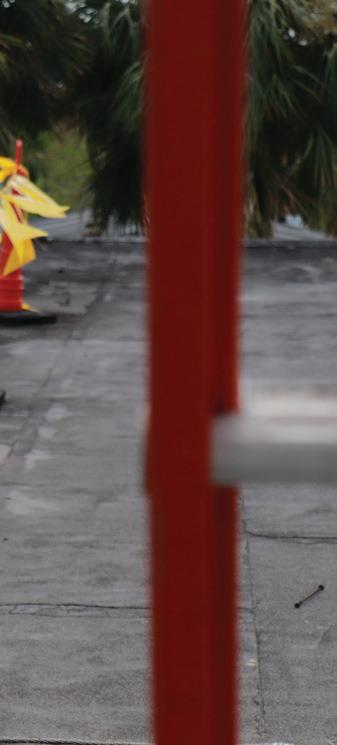


CLIMBING THE LADDER. Equipment such as cones and ladders line the roof of the 600 building. The building’s roof, as well as the heating, ventilation and air conditioning system are being replaced as outlined by the Broward County Public School’s SMART bond program.
CONES, CONES, CONES. Cones and banners stretch across the roof of the 600 building. While the 600 building underwent various projects, the eachers in the rooms below were relocated to the 900 building until construction ended.
ROOFTOP REPAIR Atop the auditorium and overhand roof, cones and banners stand to ensure the area is denoted for construction. The work done on the 800 building led to the closure of the much used auditorium, resulting in the displacement of the drama tech students for rehearsals.
Presidential candidates Harris and Trump campaign with different policy plans
Vice President Kamala Harris plans to tackle price gouging, the unreasonable increasing of the prices of goods. Harris’ plan, which is short on details, would create the first federal ban on food price gouging, giving the Federal Trade Commission the power to prosecute companies that excessively increase prices.
FAormer President Donald Trump has proposed and enacted many tariffs in order to make foreign companies pay money into the U.S. Treasury. One of these proposals is a 10% tariff on all imported goods. Economists say it will make grocery prices for Americans more expensive, especially fruits and vegetables.
key part of Harris’ messaging is offering a new child tax credit. Currently, the tax credit gives up to $2,000 per child and is only available to parents with a tax liability or earnings. The proposed idea would increase the credit to $6,000 for newborn children, $3,600 for children ages 1 to 5, and $3,000 for children ages 6 to 17.
Trump’s tax plan proposes an unspecified child tax credit expansion alongside tax breaks, primarily for the wealthy.
Under the Biden-Harris administration, the cost of insulin has been capped at $35 per month for many Americans, and the federal government began directing price negotiations on 10 widely used drugs paid for by Medicare, with plans to add more drugs to the list in the future.
During the Sept. 10 Harris-Trump debate, Trump said that he would replace Obamacare, but when asked if he had a health care plan he answered only that he had “concepts of a plan.”
n 2019, as a senator, Harris proposed legislation to create an Office of Climate and Environmental Justice Accountability and introduced climate justice advisers in federal agencies to evaluate environmental rules’ impact on lowincome communities. Harris recently changed her view on fracking from anti to pro-fracking.
rump previously pulled the U.S. from the Paris Climate Agreement, an international treaty on climate change that covers climate change mitigation, adaptation and finance. However, President Joe Biden rejoined when he took office. Trump would most likely exit the agreement again. He supports the fossil fuel industry and fracking.
arris aims to reduce Americans’ housing costs by making housing more abundant. She wants to encourage localities to allow more multi-family housing construction, open up federal lands for residential development and provide tax incentives to builders who construct low-cost homes for first-time buyers.
rump is promising to lower housing costs by stopping immigration and increasing deportations. According to a 2024 study conducted by the Pew Research Center, more than two-thirds of households with an unauthorized immigrant contain American-born or lawful immigrant residents.
Harris told CNN she wants to pass House Bill 2, a border bill negotiated earlier this year by President Joe Biden and a bipartisan group of senators. It would have put $20 billion toward new security measures at the southern border and imposed new, more restrictive policies. Republicans ultimately killed the bill at Trump’s direction.
he former president would launch the largest deportation effort in U.S. history if reelected, paid for with redirected military funds, Reuters reported. He lacks a concrete plan on how this would be executed. Trump would also create stricter requirements for border crossings.
n terms of foreign policy, Harris said that she will “ensure America always has the strongest, most lethal force in the world.” While both Harris and Biden support a ceasefire, their administration is sending more military aid to Israel as they continue bombing Gaza.
Trump believes in the unconditional protection of Israel and that the people of Gaza are “terrorists.”
arris consistently supported abortion rights during her time in the Senate, including sponsoring legislation that would have banned common state-level restrictions, like requiring doctors to perform specific tests or have hospital admitting privileges in order to provide abortions. She has maintained her support of reproductive freedom.
T
rump appointed half of the Supreme Court justices that voted to overturn the protection of abortion nationwide. He has repeatedly bragged about this fact. Trump said he would not sign a federal abortion ban during the September presidential debate, stating it would be unnecessary. However, he avoided questions about whether he would veto a ban if elected president.












New patients receive 15% off your first cosmetic treatment! your healthiest skin yet!
Experience the difference of targeted treatments and compassionate care—book your consultation today and unveil Boca Raton | Fort Lauderdale 561.886.0970 sanctuarymedical.com







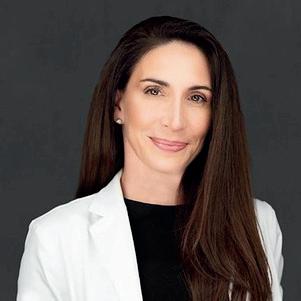


First-time student voters at MSD make voting decisions regarding upcoming presidential election
I will be voting in this election because it allows for me to have a say in shaping politics that impact my life and my future. I think that abortion rights is especially a recent pressing issue because of the overturning of Roe v. Wade and will drive me to vote. Every vote contributes to the overall outcome, and everyone should have the mindset that their vote is important.”
Aesha Bhavsar, 12













When I look at a candidate’s campaign, I always look for their stance on women’s rights, people of color’s rights, poverty and overall keeping the streets safe. A political issue that drove me to really vote was the most recent presidential elections. The candidates felt like polar opposites, and it felt like people were just voting for a better option between the two.”
Grace Bird, 12
Without people voting, no decisions would be made, and the laws and policies that are put in place wouldn’t reflect what the average person wants. It’s the school-related issues that decide what life will be like for students, so I will use my vote to make a change that I believe in. Even though I’m only one person, I could still be that one person who sways the vote, and a lot of the votes depend on a majority of a certain percentage.
Parker Haug, 12

Every year, we make sure the kids register to vote early. In past years, we’ve taken buses or met at a facility. Luckily, I think that [MSD students] care about voting. I think it’s incumbent upon us, as educators, to encourage them to understand the impact they can make on a daily basis. The best advice I can give to voters is to try to disseminate what’s truth from fiction out there on the internet and know what it is you are voting for. If you don’t participate in the government, you can’t complain about the outcome.”
Jeff Foster, AP Government Teacher











From coconut trees to ‘Club Classics,’ Gen Z culture shapes 2024 presidential election
In early July, the hope for the presidency among Democrats was rapidly dwindling as concerns ramped up on the capability of President Joe Biden to serve a second term. Former President Donald Trump was leading in almost every poll in battleground states, and Democratic voters were increasingly losing confidence.
Then, Biden dropped out of the race on July 21 and endorsed Vice President Kamala Harris to be the Democratic nominee. Immediately, Harris’
campaign expanded its efforts to galvanize Democrats.
On Aug. 2, Harris officially became the Democratic nominee for president when she secured the support of more than 2,350 delegates. In doing so, it brought new life to the presidential election, and with it, an effort to earn the vote of Generation Z, those born from 1997-2012. Both candidates are doing so through celebrity endorsements, TikToks and pop culture references.
TAYLOR SWIFT endorsed Kamala Harris on Sept. 10 via an Instagram post, signing off as “childless cat lady.”





BILLIE EILISH and her brother Finneas both endorsed Kamala Harris via a video posted to Instagram on Sept. 17.
OLIVIA RODRIGO is outspoken about abortion rights and has consistently shown her support for Kamala Harris.
MEGAN THEE STALLION endorsed Kamala Harris and performed at her Atlanta rally on July 30.
CHARLI XCX endorsed Kamala Harris, tweeting “kamala is brat” on X, formerly known as Twitter, on July 21.

“bumpin’ that” presidential candidate
This summer, singer-songwriter Charli XCX released her album “BRAT,” which immediately took off online and in pop music circles. The album’s tracks have generated attention and discussion, with Harris using this to her advantage following an endorsement from Charli XCX.
“kamala IS brat,” Charli XCX tweeted after Harris announced her bid for president.
Kamala HQ (@kamalahq), Harris’ social media campaign page, completely rebranded to embrace the lime green color and iconic font of the album. The song “365,” the album’s closer,
ELON MUSK has consistently endorsed Donald Trump, speaking at his Oct. 5 Pennsylvania rally and posting his support on X.
Charli XCX and Chappell Roan influence Kamala Harris’ presidential campaign
was quickly featured in one of Kamala HQ’s TikTok videos.
Also trending this summer was rising pop sensation Chappell Roan, who originally gained fame after her single “Good Luck, Babe!” went viral on TikTok in April. Songs off her debut album, 2023’s “The Rise and Fall of a Midwest Princess,” then proceeded to go viral as well.
Kamala HQ appears to be capitalizing off of Roan’s popularity among Gen Z to motivate young voters. The account posted a TikTok to a Roan audio from her song “Femininomenon,” in which Roan declares, “but what we really need is
a femininomenon.”
Roan released merch as well, including a camouflage hat with the yellow words “Midwest Princess” written on it. Shortly after Harris announced her vice president pick, Minnesota Gov. Tim Walz, Harris’ team released an extremely similar camouflage hat to Roan’s, with the words Harris and Walz written on it in the same yellow color.
Roan herself responded to the hat by quotetweeting a post that put the two hats side by side along with the question: “Is this real?”
election map, and it’s completely different, but also still an election map
If young voters voted at the same rate as voters 65 or older, Democrats would likely sweep in the electoral college
Q: Of all the pop culture-related election content you have seen online what has been your favorite?
Q: Do you feel that this content has made you or your generation more invested in the election?
Undoubtedly, the easiest way to reach a wide Gen Z audience is through TikTok. With over 1 billion active monthly users, 60% of which are Gen Z, TikTok serves as everything from a news to entertainment source for teens. Both Harris and Trump’s campaigns have embraced TikTok as part of their campaign strategy; Harris has over 5 million followers, Kamala HQ has another 4 million and Trump has over 11 million.
On TikTok, Trump attempts to appeal to Gen Z by posting with Jake Paul, a public figure popular for the YouTube videos he used to make and currently, for his wrestling career and upcoming fight with Mike Tyson. In fact, three of Trump’s posts on the platform currently feature Jake. Harris’ social media campaign has largely taken to participating in TikTok trends. For instance, Kamala HQ has posted a video to “Juna” by Clairo, partaking in the “You know me” trend, as well as a video to “No Hands” by Roscoe Dash and Waka Flocka Flame, partaking in the “Something I’m not afraid to say” trend. These posts have accumulated over 315,000 and 500,000 likes on TikTok respectively.


I saw this remix of the debate where there was a clip of this woman eating a dog and a cat at the same time and in the background there was the video of Trump during the debate... I thought it was very funny. It’s made me more excited [for the upcoming election]... It’s going to be funny to watch.”
Katie Royter, 9

I like the brat stuff. I think pandering to the Gen Z audience by uploading memes and funny TikToks is a good way to encourage the younger population to interact with this election.”
Riley Walsh, 12


[My favorite thing I’ve seen] is just Kamala Harris’ TikTok page because I think its funny... They try and keep up with Gen Z voters because I kind of think its like the biggest pool this year, so they follow trends on TikTok.”
Aubrey Kasen, 10


MSD staff reveal their hobbies and alternate careers
Digital Video Technology teacher Eric Garner has served as a background extra in several films, including “Iron Man 3” and “Rock of Ages.” While studying communications at Florida State University, Garner met his ex-wife who had always wanted to appear on television. Ironically, the pair met the producer of “Shark Week” during a beach trip, who agreed to let them appear as extras in an episode. While they were on set, Garner met an agent who helped him kick start his temporary career as a background extra. While acting as an extra for several movies, Garner met multiple celebrities including Tom Cruise, Russell Brand and Paul Giamatti. However, his favorite part of working in film is watching his lectures be applied to the industry.

Advanced Placement Capstone Seminar teacher Andrea KowalskiRospierski was initially inspired to rock climb after training to work at an indoor rock wall; however, she stopped to complete her teaching certification.


“My favorite part is going to set and getting to see what I am teaching in the classroom,” Garner said.

Involved since 2018, Advanced Placement World History teacher Devin Schaller is the guitarist and lead singer for cover band “Mischief.” The band members include drummer and band founder Jerry Turmaine, who is an MSD guidance counselor; lead vocalist and pianist Christina Gilbert; and bassist Amy Seplin. The band typically performs two to five shows per month at large city events, occasionally drawing crowds of nearly 600 people. Schaller was introduced to the guitar via his roommate during his first year of college.
“I played ‘Wonderwall’ a million times and annoyed everybody,” Schaller said. “I was playing guitar seven hours a day, every day, so I practiced a lot.”
From there, he played acoustically in public spaces and joined bands, eventually settling with “Mischief.” The band has made exceptional progress, playing at larger venues for higher prices after each show. To prepare, each musician individually practices songs with their corresponding instruments before meeting up–typically once a week–to run the songs together. In his free time, Schaller likes to produce his own music, pulling inspiration from his emotions and experiences.
“When you create something… it lasts longer than you do,” Schaller said. “So even after we die, this stuff still is around. And so creating my own music… for me, personally, [is] what’s my greatest accomplishment.”
Years later, her son wanted to try rock climbing after being fascinated by the film “Arctic Ascent;” consequently, KowalskiRospierski quickly returned to the sport, so the family could practice.
Her record climbing height is 60 feet, and her proudest achievement is completing a 5.9 climbing route, ranked moderately on the difficulty ranking scale.
“It’s really fun, like a physical and mental challenge,” Kowalski-Rospierski said. “You have to be able to hold yourself on the wall, but then you also have to be able to figure out which path you’re gonna take and how it’s going to work.”





n 1992, current MSD math teacher Jeffrey Taylor decided to take a break from teaching his previous seventh grade math class and became a flight attendant for Northwest Airlines before it eventually merged with Delta Air Lines in 2010. His favorite memories associated with being a flight attendant are shopping in Seoul, Korea and Taiwan.

Alicensed captain since 2000 and scuba instructor for nearly 36 years, school counselor Jerry Turmaine runs his own business, Parrot Island Scuba Adventures, where he dives and trains divers along the Florida coast.
He gained interest in the industry during a vacation with his wife to Cozumel, Mexico in 1991, where he tried scuba diving for the first time.

“It was like the coolest thing ever did,” Turmaine said. “So before the wheels of the plane hit the ground at home, I had already signed up for certification
Turmaine has dived in various areas around the world;his favorite locations include Fiji and Australia.
His “coolest” diving experience was when he and his crew spotted and swam with
His most exciting dive was a great white shark cage dive in Australia.


Student Government Associations hosts annual Homecoming week activities

Sept. 16
“Megastar Monday” Dress as your favorite music or movie star
E L C O M E to a night in

Sept. 18
“Grateful Dead @ the Sphere” Dress in tie dye
Sept. 17
“Winning Team Tuesday” Dress in your favorite sports attire
Sept. 19
“Throw It In Thursday” Anything but a backpack (non-metal version)
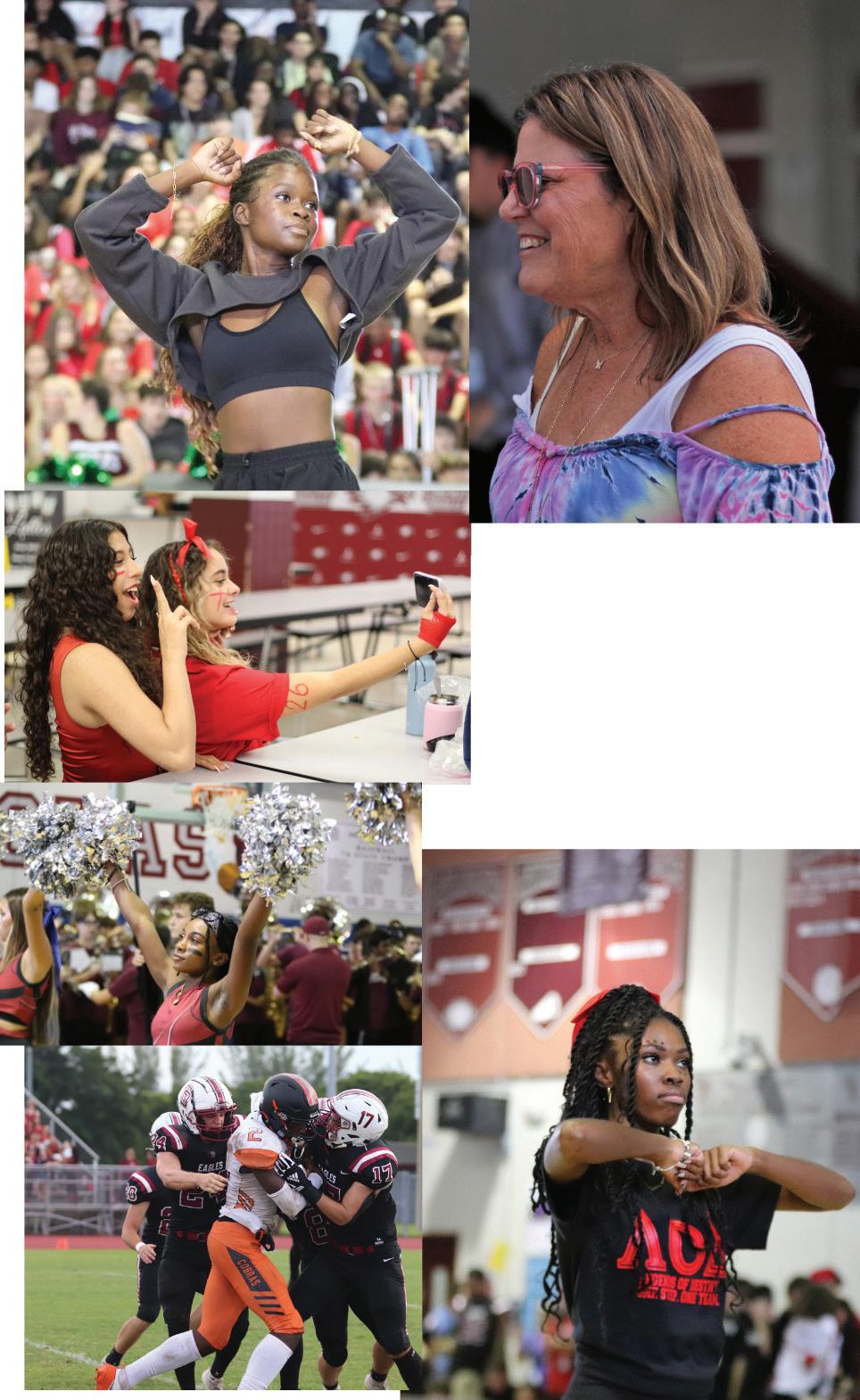
Sept. 20
Sept. 20
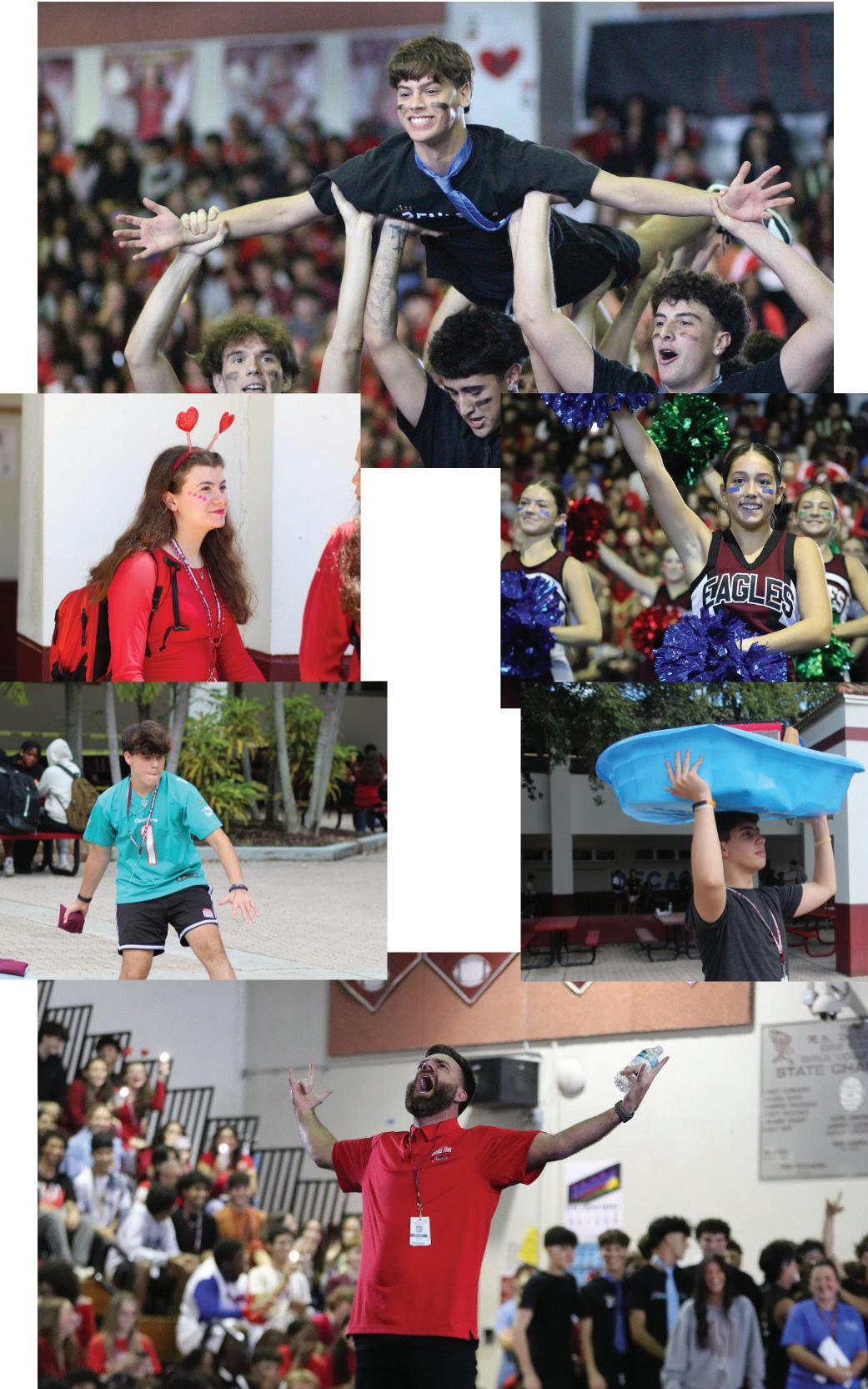
Sept. 20
Sept. 21

Harris cares for American people, Trump only cares for himself
n Nov. 5, two potential fates await the American people. This could be the day the nation upholds democracy by electing Vice President Kamala Harris as president, or the day the nation makes a mockery of the Constitution by electing former President Donald Trump. This is why Harris must be elected; she stands for patriotism, freedom, safety and equality, while Trump stands only for himself.
Trump only values safety and security for a select few; he consistently upholds problems existent in America’s criminal justice system, including systemic racism and white supremacy. As mentioned in a July 2020 article by CNN, Trump called the words Black Lives Matter a “symbol of hate” and has posted racist videos on his X, formerly known as Twitter, page, including one of a supporter chanting “white power.” On the contrary, Harris has attended peaceful BLM protests and shown her support for the movement to end police brutality.
Moreover, Trump is a convicted felon, while Harris is a former prosecutor. This fact alone should be reason enough as to why he is unfit for the presidency. Some of his most serious criminal charges are associated with his attempt to overturn the 2020 presidential election; he falsely claimed the election was “stolen” and provoked his supporters to commit an insurrection at the U.S. Capitol on Jan. 6, 2021. Such acts of violence are a threat to free and fair democratic elections.
“Anyone who puts himself over the Constitution should never be president,” Trump’s former Vice President Mike Pence said in a statement after Trump’s indictment for trying to override the 2020 election.
Since Trump’s previous vice president is unwilling to support him as president–and neither does former Defense Secretary Mark
Esper, former National Security Adviser John Bolton, former Trump aide Sarah Matthews nor Trump’s nephew Fred Trump III for that matter–Trump appointed Ohio Sen. J.D. Vance as his 2024 vice president nominee. This is the same man who wrote in a 2016 New York Times article that “Mr. Trump is unfit for our nation’s highest office.”
It goes without saying that Vance was right: Trump is unfit for office. Unfortunately, so is he.
Vance is extremely sexist as is evident in his remarks about how the Democratic party is run by “childless cat ladies,” referring to women in government positions who do not have biological children, such as Harris.
While he focuses on belittling women, Harris empowers them. Harris has visited a clinic that provides abortions, being the first vice president and, if elected, first president to do so according to NBC. Meanwhile, Trump is responsible for appointing three of the six Supreme Court justices that overturned Roe v. Wade in 2022, and Vance has stated that he supports the 15 week nationwide abortion ban proposed by South Carolina Sen. Lindsey Graham.
Trump’s actions visibly contradict his words. Often, he claims that he cares about and will resolve issues in the U.S., but proceeds to act in a manner that completely contradicts said claims For example, he is quick to claim that he cares
“Harris must be elected; she stands for patriotism, freedom, safety and equality, while Trump stands only for himself.
Someone who is misogynistic should not be representing the 168 million women in the U.S. A man like Harris’ vice president pick, Minnesota Gov. Tim Walz, who signed a law into effect in Minnesota that made tampons freely available to students in school restrooms, should be.
Vance’s sexism means he has something in common with Trump though, as Trump has a tendency to make sexist comments about women who criticize him. For instance, he reposted a tweet on his Truth Social platform that implied a vulgar message involving a photo of Harris and Clinton.
Using prejudice to create fallacies about a person is highly immature behavior. Harris and Walz know this, as do most kindergartners, but Trump and Vance do not.
about and will solve the immigrant “invasion” at the U.S.-Mexico border, but when bipartisan House Bill 815, aimed at increasing the number of border control agents there, came before Congres, he ordered Senate Republicans to kill it.
Trump does not just lie about caring, he also flat-out lies about problems in general, such as gun violence. At his first rally post-assassination attempt, Trump stood behind a pane of bulletproof glass as he stated, “America does not have a gun problem.” The irony of this is clear: he is quite literally shielding himself from the gun problem that he claims does not exist.
Trump and Vance are more concerned with defending the right to bear arms than with the lives of children. Vance’s first response to the Apalachee High School shooting on Sept. 4
that left two students and two teachers dead was to come to the defense of gun ownership and proclaim school shootings “a fact of life.” Trump infamously told Iowans “we have to get over it” a day after a shooting at an Iowa high school. Their actions speak for themselves and more disgusting things could not have been said about literal tragedies.
Harris has made it clear that she intends to prevent mass shootings, not take away Americans’ Second Amendment rights. While campaigning in Maryland this year, she said, “It is a false choice to suggest that you’re either in favor of the Second Amendment or you want to take everyone’s guns away. I’m in favor of the Second Amendment, and we need an assault weapons ban.” Simply put, Harris, a gun owner herself, rightly believes that weapons of war–designed to kill a lot of people very quickly–have no place on the streets of a civil society.
When voting in November, it is important to keep morals in mind. One of the presidential candidates has said “Women, you have to treat them like sh*t.” The other is pro-choice and a proponent of women’s rights.
One has said “Laziness is a trait in Blacks.” The other supports ending systemic racism.
One has said “They’re [Mexican immigrants] bringing drugs. They’re bringing crime. They’re rapists.” The other views immigrants as human beings and has stated, “[Immigration] cannot be reduced to a political issue. We’re talking about children; we’re talking about families. We are talking about suffering.”
Suffice to say, one of the candidates is entirely unrepresentative of the equality and diversity the U.S. prides itself on, and the other is Kamala Harris, the one fit for presidency.
OPINION BY Eagle Eye News
Editorial Board
GRAPHIC BY Grace Brill
The U.S.’s outdated criminalization of marijuana is coming to a close. Floridians have the opportunity to become the 25th state to legalize recreational marijuana this November. Long debated, the topic has recaptured Florida’s attention. Legalization presents numerous benefits to society, which is why voters should vote yes on Amendment 3.
If passed, Amendment 3 will allow “adults 21 years or older to possess, purchase or use marijuana products and marijuana accessories for non-medical personal consumption by smoking, ingestion, or otherwise…,” according to the Florida Divisions of Elections.
The amendment will need to be approved by 60% of voters in order for it to pass and the measure according to an August poll conducted by University of North Florida’s Public Opinion Research Lab is favored by 64% of voters.
Legalizing recreational marijuana will result in an estimated $195 million to $431 million in additional tax revenue for the state according to figures released by the Florida Financial Impact Estimating Conference in 2023. The state legislature would have the final say in how those tax dollars would benefit Floridians.
Use of tax revenue in other states includes programs like funding public education, substance abuse programs, fire and police services, public defenders and veterans. If Florida uses the funds like other states do, then everyday Floridians stand to benefit from a variety of social and community programs.
Legalizing recreational marijuana would also allow people who can not afford the costs
of medical marijuana to be treated for their pain.
Florida allows people to obtain medical marijuana cards, but according to Medical Marijuana Treatment Clinics, the initial doctor’s assessment begins at $350 in addition to a medical card that costs $75.
Since medical marijuana is not approved by the FDA, insurance does not cover the costs of obtaining the card. Then, the patient has to pay for follow-up doctors’ visits to keep the card on top of the medical marijuana products that they need to purchase.
Amendment 3 takes progressive step to align with public opinion

Those that cannot afford these costly medical visits may go untreated. Recreational marijuana makes it easier for people to treat chronic pain and other illnesses, while also eliminating marijuana bought on the illegal drug market, which results in a safer product and does not fund dangerous drug cartels and criminal organizations.
There is a risk to consuming non-regulated marijuana products. The Drug Enforcement Administration identified a 35% increase in the number of deaths due to laced marijuana products between 2020 and 2023. Eliminating the illegal drug market in favor of a heavily regulated marijuana market reduces the risk of consuming laced marijuana and ensures
Nebraska, Utah, New Mexico, Minnesota, New Jersey. All of those states, though different politically, have legislation that requires period products to be supplied in restrooms free of charge. In Florida, however, Gov. Ron DeSantis vetoed funding that would have provided funding for free pads and tampons in schools, despite the necessity of such legislation.
Florida must enact legislation to store menstrual products, specifically pads and tampons, in bathrooms for any students that may need it, because period products are a basic necessity.
A lack of access to menstrual products is a health issue. Period products prevent infections, such as yeast infections, which can be caused by improper hygiene, according to a 2020 article by Medical News Today.
Additionally, being without menstrual products may force people to keep tampons in for longer than is medically safe. Tampons should be left in for no more than eight hours because of the risk of toxic shock syndrome, which is caused by an overgrowth of bacteria.
Toxic shock syndrome is life-threatening, and teenagers are particularly at risk because they are more likely to leave a tampon in for longer. This may be compounded by a lack of access to menstrual products during large parts of the day, while they are at school.
By making products very easily accessible to students since they will see them every time
Schools need to provide menstrual products in school restrooms
they go to the bathroom, students may be less likely to leave a tampon in for longer than the recommended time frame. They have a greater ability to change out their tampon, which could reduce toxic shock syndrome rates among teenage girls.
As such, it is necessary for the products to be stored in bathrooms. Some states, like Alabama, require menstrual products to be free for students, but they are kept and dispensed by a school nurse or a designated female faculty member.
However, the primary benefit of the law is to make pads and tampons accessible to all students, who may not have access to them otherwise. Forcing students out of their way to seek someone out for a pad or tampon decreases the ease of accessibility and increases the capacity for shame, meaning the law will ultimately not be helpful in increasing access to menstrual products.
Lacking access to menstrual products, according to the United Nations, is called “period poverty.” It primarily affects low-income, homeless, in college, imprisoned or transgender people, though it can affect anyone.
In 2021, poverty affected over 16 million menstruating people, and two-thirds had financial barriers to buying menstrual products. Period products are incredibly expensive, with Bloomberg reporting that pad and tampon prices rose 8.3% and 9.8% in 2021, respectively.
Period products are taxed as a luxury good
consumers are receiving a safe product.
Florida houses 90,000 prison inmates, which is estimated to increase up to 124,000 inmates in the next 20 years according to the Miami Herald. According to the Last Prisoner Project, 33.69% of all arrests made in Florida were a result of marijuana possession. The Tampa Bay Times reported in 2022 that Florida prosecutors filed 16,000 charges for marijuana possession according to the Sun Sentinel.
Legalizing recreational marijuana will help alleviate Florida’s prison overpopulation problem. Several law enforcement agencies in Florida support the measure because it allows them to concentrate their efforts on actual crime.
The stigma surrounding marijuana is based on false narratives and biases, including the idea
that marijuana is a “gateway drug” to other addictive drugs. Multiple studies, including one published this year in Psychological Medicine have found that recreational marijuana laws have not increased substance abuse disorders and may reduce alcohol-related problems.
Like any substance, overconsumption should not be supported. The state legislature can add regulations to marijuana use, including designated smoking areas and enhanced warning labels to help ease the concerns of those opposed to the measure.
The legalization of marijuana in Florida is way past due and passing Amendment 3 is a step forward to improve the lives of all Floridians.
OPINION BY Lyla Sachs
GRAPHIC BY Liliana Griffis

in many states, as reported by the Alliance for Period Supplies. Period products are commonly taxed at the same rates as electronics, toys and makeup. Food stamps, designed to help those without access to items needed for survival, cannot be used to receive tampons or pads.
Students affected by period poverty may require free pads and tampons more than other students, and by leaving them in a bathroom, those students will feel less pressure since they simply have to grab what they need.
Eagle Eye News reported last year on the rise of chronic absenteeism in Broward County. In 2022, 16 million students were deemed chronically absent in 2022, according to PBS. Providing period products may reduce the high figure of absences. According to a 2019 article by CBS News, 1 in 5 Americans have left school early or missed school because they did
not have access to products. Using this figure, about 3.2 million chronically absent students may have missed classes due to a lack of access to period products at school.
In a study by St. Louis University, 36% of people surveyed on period poverty who were employed either full-time or part-time had to miss one or more days of work a month due to a lack of menstrual products while on their periods.
Providing period products in restrooms increases students’ health and provides access to menstrual products for those who may not otherwise have access. Florida needs to legislate access to free period products in school restrooms in the next legislative session.
OPINION BY Ahana Tippanagoudar and Brynn Schwartz
GRAPHIC BY Lynn Soivilus
“ Mymomgotmemyfirst paddlesetaboutayear ortwoago,Iwenttogo playandIfellinlovewith thegameeversince.Ifeel likethemostexcitingpart aboutpickleballisgetting tomeetnewpeople throughplaying.”
AidenGraber,10
We love this sport, and we wanted to share that love with as many people as possible. We had been seeing that it has been a rising sport over the past couple of years... so we went ahead and made one [a pickleball club].” Michael Fierstat,12 “

Pickleball combines existing sports to form a sport of its own with unique rules
Begin each rally with a serve diagonally to one’s opponent
After a serve the ball must bounce once on the receiver’s side before the receiver can return it. Then, it must bounce again on the serving team’s side before it can be volleyed. Each point is continued until a fault is committed or someone hits a winning shot.
The seven inch zones on each side of the net are non-volley zones, otherwise known as “the kitchen.”
Pickleball experiences growth in popularity, capturing attention of MSD students and faculty
ver the past decade, pickleball has transitioned from a niche hobby to a mainstream recreational activity driven by its appeal to players of all ages and skill levels. The sport’s slower pace and inclusive nature has made it a popular choice for people seeking a fun and accessible way to stay active. As of 2023, there were an estimated 48.3 million pickleball players worldwide according to the Association of Pickleball Professionals, including Marjory Stoneman Douglas High School students and faculty members.
Pickleball combines existing games like tennis, badminton and ping pong to form its own concept: a
paddle sport played on a smaller court with a perforated ball. The sport is played on a rectangular 44-foot by 20foot court divided through the middle by a low net.
The two longer sides of the court are called the sidelines, while the two shorter sides are called the baselines. Each side has one center line making two service courts and a line parallel to the net called the non-volley line, which creates a non-volley zone. In the non-volley zone–or the kitchen–players are prohibited from serving or striking the ball.
Pickleball’s accessibility has made it a fan-favorite in Florida, with the sport continuing to leave its mark on high school students across the state.
“My mom got me my first paddle set about a year or two ago. I went to go play, and I fell in love with the game ever since,” sophomore Aiden Graber said. “I feel like the most exciting part about pickleball is getting to meet new people through playing.”
While not officially recognized by the Florida High School Athletic Association, a variety of high schools across Florida counties have integrated pickleball teams and clubs into their list of athletics. This includes MSD’s Pickleball Club, founded by seniors Michael Fierstat and Michael Cacace.
“We’re here to have fun, do tournaments and teach people how to play pickleball because it is an up and
ONE POINT AT A TIME. English teacher Holly Van Tassel and Physical Education teacher Elisa Williamson team up in a game of two-on-two pickleball. The game took place on Sunday, Sept. 29 against and allowed the teachers to unwind and have some fun before the long school week ahead. “Herzfeld reached out to few people who lived close by together and she taught us to play,” Van Tassel said. “We planned to play weekly from the start, and we all enjoyed it, so we continued.”
IN A PICKLE. Drama teacher Melody Herzfeld returns a serve, effectively tying a close game of pickleball. Every Sunday a handful of MSD educators, including Herzfeld, English teacher Holly Van Tassel and Physical Education teacher Elisa Williamson, play rounds of pickleball at the courts east of Coral Springs Middle School. “Playing pickleball helps take my mind off of things,” Herzfeld said. “[DECA teacher] Sharon Cutler made me play, and she taught me how to play.” PHOTOS BY LUKE DAUTRUCHE

Three friends, Joel Pritchard, Bill Bell and Barney McCallum, invented pickleball. The first game was played in Pritchard’s backyard and the name pickleball is believed to have been inspired by the name of Pritchard’s dog, Pickles.
At Washington’s South Center Athletic Club the first known pickleball tournament was played.
Pickleball becomes increasingly mainstream since its creation
A pickleball corporation was founded and standardized equipment was established.
The USA Pickleball Association was founded by Sid Williams. The USAPA created the first pickleball rule book, offered players resources and hosted events related to pickleball.
coming sport,” Cacace said. “I feel like it’s gotten so popular recently because it’s easy to play. It is more simple than tennis; I would say, because there isn’t as much running around and movement. Also, the games last quickly and only go up to 11 [points].”
Fierstat and Cacace first had the idea to start the club as sophomores in 2022 and formed the club later that year.
Members learn the rules of the game and gain experience playing, traveling to various pickleball courts in the Parkland and Coral Springs area. Towards the end of the year, the club holds a tournament between teams of two, and the winning team earns a pizza party.
The club usually practices at Terramar Park in Parkland, playing against each other in an effort to collectively improve and make lasting connections with peers. The pickleball club held their first meeting of this year on Thursday, Sept. 5 in room 732, attracting a wave of interested new members to the group.
“We love this sport, and we wanted to share that love
with as many people as possible,” Fierstat said. “We had been seeing that it has been a rising sport over the past couple of years, and people had been asking why a club had not been created yet, so we went ahead and made one.”
Pickleball’s growing popularity has sparked controversy as states like Florida consider converting beloved community spaces, including state parks and community spaces, into new courts.
However, these proposals have led residents and community groups to express concern about the potential loss of other beloved public amenities.
On Saturday, Aug. 21, the Florida Department of Environmental Protection revealed major development proposals for nine state parks, including adding 350-room hotels, golf courses and pickleball courts inside, clearing out acres of protected land and the wildlife that inhabits it.
Since the proposal was made public, the state has received significant backlash from state park officials, conservationists and citizens alike opposing the
proposition, citing the ethical and environmental issues the construction would cause.
“Building pickleball courts in natural habitats really has no benefit,” Climate Change Club Co-President Julia Iuchyk said. “In South Florida, we are blessed with such unique environmental terrains like the Everglades, and building over these state parks will disrupt wildlife and add on to the worsening effects of climate change. Pickleball has just recently become popular, so while it is valid to believe it is a growing trend, it does not justify sacrificing these natural beauties for something that might not be played in the coming years.”
Still, pickleball continues to gain traction across a wide array of demographics due to its engaging nature and accessibility. The sport’s growth is evident in the increasing number of courts, leagues and players worldwide. As the sport evolves, it remains to be seen how it will shape sports culture, high school athletics and community engagement.
STORY BY Luke Dautruche and Natalia Solera
Florida Panthers
Goaltending Coach Robbie
Tallas brings Stanley Cup to MSD on Sept. 6

Before the Stanley Cup was displayed in the campus auditorium on Sept. 6, student journalists at MSD interviewed Florida Panthers Goaltending Coach Robbie Tallas about the Panthers championship season on Monday, Aug. 26. The interview has been edited for length and clarity.
What does winning the cup mean to you?
It’s such a hard trophy to win; they say it’s the hardest trophy in all sports to win, just how you have to work together, and so many things have to go right. When you think up this year was just an incredible, incredible accomplishment. It’s been a lifetime dream to have [my] name etched on that cup, and I can’t wait to have my day with it.
What do you tell players to get them hyped up before a game?
Once you know the personalities of your players, that’s probably the most important part of it, because then you can use your triggers to what is going to get the best out of that guy. I will say this, that game seven of the Stanley Cup Finals, Edmonton came back hard on us. Now it’s do or die. It’s one game, and our coach’s [Paul Maurice’s] speech before the game was incredible. His message to our players was truly about playing with freedom and giving them the permission to go out there and not be afraid of mistakes, and if you make a mistake, someone else will be there to back you up.
Can you describe the feeling you had when you first got on the ice?
It’s one of the best feelings because you’re the first one out of that tunnel, so you’re kind of leading your team out. When you’re hunched over and you’re looking up, and all you see is a tunnel, and you can see the start of the fans, it’s one of the best feelings. It’s a feeling of a quarterback running out under the field, in a sense, once you come out of that tunnel, and now you have the whole stadium in front of you. It is one of the best feelings, but I was so nervous that game. I didn’t want to remember what happened until after.
Do you think the community aspect of the team has helped their play this season?
You have to have your leaders, and your leaders have to pull guys in the right direction, and then those guys have to get on page too. We have some star players on our team. There’s no question. Every team has it, but there’s some elite stars on some other teams, and that doesn’t guarantee a win in sports. It is a community team where for us to win; everybody has to contribute at some point throughout the game.
Aside from bringing the Stanley Cup to MSD, what else will you do with it?
I’m gonna go to Westglades; I’m gonna go because my daughter’s at Westglades, and my other daughter’s at Somerset, so I’m gonna go to all three schools. I plan to take it to the Coral Springs fire department and police station, Station 80, so we’re gonna spend some time down there. We have like a little limo bus that we’re gonna tour around. We’re actually gonna hit some local businesses and just pop in [to surprise them].
REPORTING BY Noah Lechtenstein, Ashveen Saini and Andie Korenge

Video: Florida Panthers win first Stanley Cup in franchise history in 30th season







Entered the playoffs as the third seed in the Eastern Conference with 110 points
Defeated the Tampa Bay Lightening in 5 games, the Boston Bruins in 6 games and the New York Rangers in 6 games
Defeated the Edmonton Oilers in seven games to win the Stanley Cup

Became the ninth team in NHL history to win the Stanley Cup after losing in the Finals the previous year
Panthers Head Coach Paul Maurice won his first Stanley Cup in his 26th season coaching

Right Wing Matthew Tkachuk and teammates took the Stanley Cup into the Atlantic Ocean the day after winning the Stanley Cup Championship
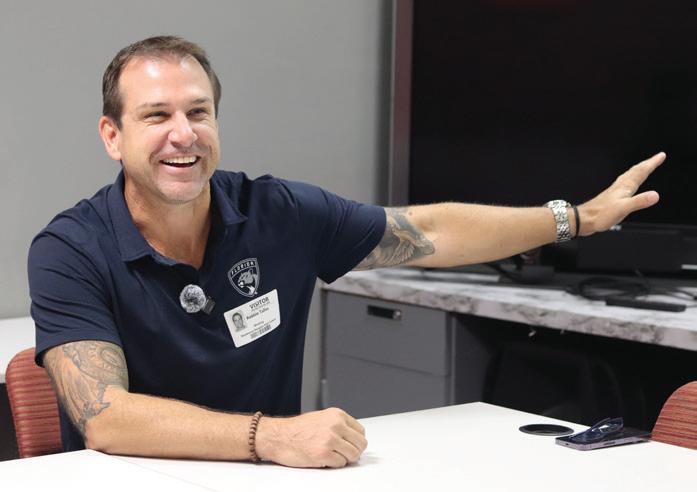


Video: Panthers Goaltending Coach Robbie Tallas discusses significance of his MSD visit

Former goalie and current Hall of Famer Roberto
ate pasta out of the Stanley Cup at Heritage in Fort Lauderdale









New NCAA settlement sparks debate over fair compensation for Division I athletes

There are two sides to college sports: the schools and the athletes. One brings in the money; the other takes it home. For years, college athletes have played without pay, while universities profit. But now, that long-standing divide is starting to shift.
Since the early 1900s, the National Collegiate Athletic Association has maintained a rule prohibiting collegiate-level athletes from receiving direct compensation for their time spent training and playing. For powerhouse Division I schools like the University of Georgia, the University of Texas and Ohio State University, student athletes are a key source of revenue for school sports programs.
The idea of direct compensation for NCAA student-athletes has sparked debate regarding whether or not collegiate athletes should be able to profit off of their athletic abilities.
Student-athletes are a key source of revenue as they attract fans to games and events, leading to ticket sales and merchandise purchases. Their participation in competitions can also generate funding through sponsorships and community support, which helps sustain and enhance the revenue of athletic programs.
Student-athletes often spend more time on the field or working out for their sport than they do in lecture halls. According the National
Collegiate Scouting Association’s website, a typical Division I athlete plays for a program that generates significant revenue and spends an average of two to three hours training daily, not including game days.
According to the Collegiate Parent website, collegiate student-athletes may spend less than two hours per day on academic work to focus more on their athletics.
“As a collegiate athlete at the University of Florida, I probably put anywhere from six to 10 hours a day at the field depending on if it’s practice or a game,”Former MSD High School alumnus and University of Florida baseball player Christian Rodriguez said.
Despite the large amount of revenue generated by college sports, student-athletes traditionally have not received financial compensation beyond scholarships and sponsorship deals.
The introduction of name, image and likeness agreements has allowed athletes to profit from brand deals, but they still do not receive direct pay from their universities. Some studentathletes can even be denied the right to profit off their NIL, depending on the state or university’s laws.
NIL deals allow athletes to be compensated by providing their name, image and likeness to companies in exchange for payments. Aside from
about the 2015-2019
O’Bannon v. NCAA
The O’Bannon v. NCAA case granted athletes the rights to their own Name, Image and Likeness (NIL), allowing them to benefit from their personal brand. This case also permitted schools to provide cost-of-attendance stipends to athletes, marking the beginning of major shifts in college athlete compensation.
In 2019, California passed the Fair Pay to Play Act, becoming the first state in the U.S. to enact an NIL law. This legislation allowed college athletes to earn money from their NIL, leading the way for further state-level and national reforms regarding athlete compensation.
these deals and athletic scholarships, studentathletes have no other sources of payment for their contributions to their schools.
“As a college commit for my sport, I mean I would find it really nice to get somewhat of a compensation because of all the hours I put in to get committed plus the hours I will be putting in next year on the field,” senior and future University of South Florida soccer player Gianna Reich said.
Recently, several lawsuits have raised the possibility that the NCAA could change its policy on compensating athletes. The most significant is a class-action lawsuit known as House v. NCAA in 2020. Former Arizona State swimmer Grant House filed the lawsuit, arguing that the NCAA’s policies violated antitrust laws by preventing athletes from benefiting from NIL deals before 2021.
The settlement that resulted from this case led to athletes receiving direct payments from their universities for their athletic efforts, something that changed the landscape of college sports compensation.
According to an article by the Athletic May 20, the NCAA owes the athletes as much as $20 billion in damages, as well as $2.7 billion in NIL back-pay damages. This settlement allows athletes to receive direct payouts for their athletic abilities and contributions. It also includes
The We Are United movement emerged in 2020, showing the growing power of athlete organizing. College athletes demanded NIL rights, revenue sharing and additional protections, forcing the public and NCAA to reconsider existing policies. This movement played a key role in changing public opinion on athlete compensation.
provisions for back-pay for former athletes who were unable to profit from NIL deals.
The case has generated debate, with some arguing that the NCAA’s policies need to be modernized to reflect the economic realities of college sports, while others believe it is more beneficial to continue to prohibit direct compensation to athletes, as it could cause extra financial stress to them.
“I personally think it’s great for the athletes because they are earning profits for themselves rather than the schools taking their money,” senior Lucia Perez said.
More lawsuits could potentially be filed to overturn the settlement if the new ruling brings imbalance to collegiate athletics.
The NCAA’s recent decision reflects how much the conversation around compensating collegiate athletes has evolved over time. From limited opportunities to profit from NIL deals to the possibility of direct pay for their contributions, athletes are seeing more avenues by which they can be compensated.
Cases like House v. NCAA have pushed the conversation forward, and the settlement represents a new chapter in the evolving relationship between student-athletes and compensation in collegiate sports.
STORY BY Carolina Ochoa and Matthew John
Athletes struggle for legal right to profit off of Division I athletics
2024 House v. NCAA Related Cases
In 2021, the U.S. Supreme Court ruled 9-0 in favor of athlete compensation rights. This ruling introduced Alston Awards, allowing schools to offer athletes up to $5,980 annually in educational benefits. The NCAA also adopted an Interim NIL Policy, officially permitting athletes to profit from their NIL without facing penalties.
By 2024, the House v. NCAA case and related legal battles resulted in a settlement that allowed athletes to receive compensation for their NIL, including back pay. The NCAA also permitted schools to facilitate NIL deals, and Virginia passed a law allowing schools to make direct payments to athletes, further expanding athlete compensation rights.